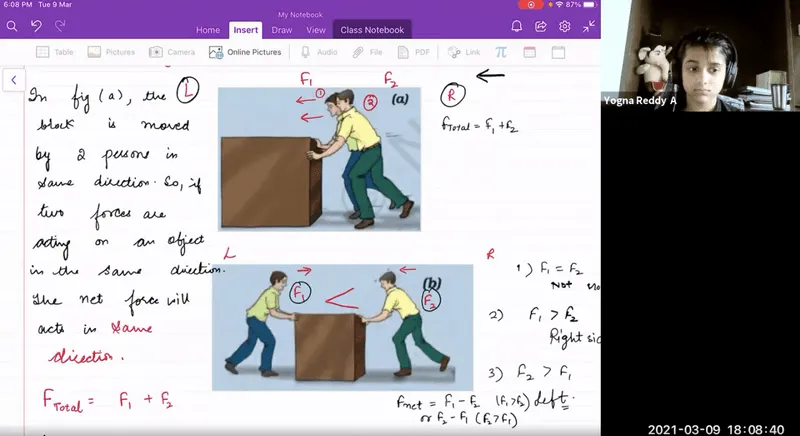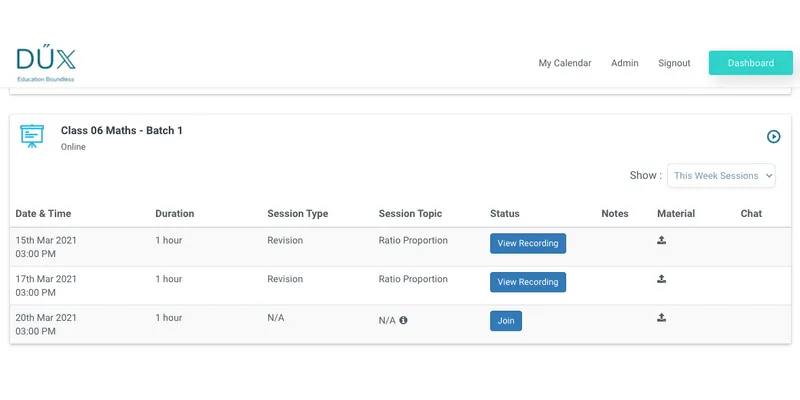This live tutoring startup is attracting students from small towns by making education 'affordable'
Bengaluru-based edtech startup DUX Education launched in the lockdown as the demand for online tuitions peaked. In seven months, it has enrolled over 15,000 students, 50 percent of which come from small towns and villages.
Does the already cluttered K-12 education market need yet another player?
Yes, reckons Rohit Jain, Founder and CEO of DUX Education, a personalised afterschool tutoring platform for students in Classes 3 to 12.
Before founding the edtech startup last June, Rohit worked in leadership roles at Zoomcar and Ola for over six years. “It was a stepping stone to starting up,” he says.
Parallelly, he’s also taught K-12 school students for more than 17 years. “More than 50 million students look for afterschool tuitions in India, but 99 percent of the tutoring market is unorganised. Most existing edtech products are either expensive, niche, or low engagement,” Rohit tells YourStory.
DUX Education, which he co-founded with Udit Chaturvedi (who has had stints with EY, Zoomcar, and mfine) wants to solve this problem of affordability, accessibility, and engagement, and create a “teacher-first world” where online learning goes beyond a lecture.
“A good teacher should guide, push, motivate, and inspire students. That was missing in edtech, with lack of engagement being a huge problem,” Rohit says.

DUX Education Co-founders Rohit Jain (L) and Udit Chaturvedi
Live tutoring and doubt-solving platform
To ensure students stay engaged, DUX Education’s live tutoring platform holds classes in batches of 10. The curriculum is in sync with the ICSE/CBSE school syllabus, and also includes non-academic subjects like Vedic Math and Phonics.
Rohit shares, “If you look at it, we are the closest to offline tuitions in terms of batch sizes, teacher’s involved attention to students, school syllabus-based coaching, and preparation for unit tests and midterms. Parents can have live PTMs; teachers can share homework or check assignments live in front of the students.”
For doubt-solving, students can raise their hand to ask questions instead of entering their question in chat — a method deployed by most edtech startups. “The idea is to bridge the gap between online and offline coaching,” the co-founder explains.
Besides live interactive classes, students can also access class recordings, share classwork and homework, and take topic-based tests and self-paced courses.
The platform also has a direct communication channel with parents who get alerted via WhatsApp if their kid doesn’t join a class within the first five minutes.

Infographic: YS Design
What affordable online learning solves
The Bengaluru-based startup also wants to solve the problem of geography in offline tuitions where parents, especially of girls, are reluctant to send their kids beyond 2-3 kilometres from home, and have to settle for a tutor available in that area.
“Our aim is to get students the best tutors from across the country. We have users from northeast India looking for tutors in Mumbai and Delhi,” Rohit reveals.
The startup claims to be the most affordable afterschool tutoring platform in India, with prices starting at Rs 500 per subject per month. This has led to a large number of students from small towns signing up on DUX Education.
The founder says, “We believe that education should be for everybody. Our prices are cheaper than what a private tutor in a Tier IV city charges. Almost 50 percent of our student base is coming from small towns like Guwahati, Siliguri, Odisha, villages around Bengaluru… our affordability has been a major difference.”
DUX Education is also experimenting with its product to make live classes accessible in low bandwidth areas. “Pricing innovation is going to be the key,” Rohit states.

DUX Edu live tutoring interface
Growth, revenue, and funding
Since September 2020, when the subscription-driven platform went live, DUX Education has enrolled over 15,000 students. “Users have ballooned since December. We also opened our affiliate marketing channels in March,” reveals the founder.
DUX Education claims that many users have bought new laptops to continue uninterrupted studies. The web-only platform expects to book revenues of Rs 1 crore for April alone, with 70 percent of students making upfront annual payments.
The startup is targeting enrollments of 100,000 students by the end of the year. It also wants to expand its teacher base from 600 to 2,500.
Rohit says, “More than 75 percent of students are coming through organic referrals from existing students. Our renewal rates are at 80 percent. Every class is rated by students, and our average class rating stands at 4.85 out of 5. The idea is to log some significant growth numbers before we go to the market to raise funds.”
So far, DUX Education has raised an undisclosed Pre-Seed funding round, which also saw participation from Paritosh Gupta, former CFO and COO at Zoomcar and now VP Finance at Koho, and both co-founders' friends and family.

Dashboard access to live and recorded classes
The K-12 afterschool market
Industry estimates suggest that India’s K-12 afterschool tutoring market covering just the ICSE, CBSE, NCERT syllabi is valued north of $10 billion.
If all the state boards are added, the market is many times bigger.
The space is dominated by the likes of BYJU’S, Vedantu, Toppr, Doubtnut, Meritnation, and others, and is increasingly witnessing consolidation. But the founders reckon this isn’t a winner-takes-all market. “There are so many aspects to live and recorded learning. I think 10 players can exist in this segment, not just 3-4,” he says.
The founder further explains, “Consolidation is happening because some companies want to have a presence in all form factors. No acquisition has happened where the [acquired] company is doing the same thing [as the buyer]. The build-versus-buy thing is playing out in edtech.”
Given India has one of the largest K-12 student populations (260 million) in the world, and an offline-only world still some time away, DUX Education is only getting started.
Edited by Saheli Sen Gupta











